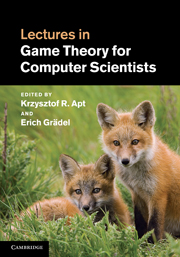Book contents
- Frontmatter
- Contents
- List of contributors
- Preface
- 1 A Primer on Strategic Games
- 2 Infinite Games and Automata Theory
- 3 Algorithms for Solving Parity Games
- 4 Back and Forth Between Logic and Games
- 5 Turn-Based Stochastic Games
- 6 Games with Imperfect Information: Theory and Algorithms
- 7 Graph Searching Games
- 8 Beyond Nash Equilibrium: Solution Concepts for the 21st Century
- Index
6 - Games with Imperfect Information: Theory and Algorithms
Published online by Cambridge University Press: 01 June 2011
- Frontmatter
- Contents
- List of contributors
- Preface
- 1 A Primer on Strategic Games
- 2 Infinite Games and Automata Theory
- 3 Algorithms for Solving Parity Games
- 4 Back and Forth Between Logic and Games
- 5 Turn-Based Stochastic Games
- 6 Games with Imperfect Information: Theory and Algorithms
- 7 Graph Searching Games
- 8 Beyond Nash Equilibrium: Solution Concepts for the 21st Century
- Index
Summary
Abstract
We study observation-based strategies for two-player turn-based games played on graphs with parity objectives. An observation-based strategy relies on imperfect information about the history of a play, namely, on the past sequence of observations. Such games occur in the synthesis of a controller that does not see the private state of the plant. Our main results are twofold. First, we give a fixed-point algorithm for computing the set of states from which a player can win with a deterministic observation-based strategy for a parity objective. Second, we give an algorithm for computing the set of states from which a player can win with probability 1 with a randomised observation-based strategy for a reachability objective. This set is of interest because in the absence of perfect information, randomised strategies are more powerful than deterministic ones.
Introduction
Games are natural models for reactive systems. We consider zero-sum two player turn-based games of infinite duration played on finite graphs. One player represents a control program, and the second player represents its environment. The graph describes the possible interactions of the system, and the game is of infinite duration because reactive systems are usually not expected to terminate. In the simplest setting, the game is turn-based and with perfect information, meaning that the players have full knowledge of both the game structure and the sequence of moves played by the adversary. The winning condition in a zero-sum graph game is defined by a set of plays that the first player aims to enforce, and that the second player aims to avoid.
- Type
- Chapter
- Information
- Lectures in Game Theory for Computer Scientists , pp. 185 - 212Publisher: Cambridge University PressPrint publication year: 2011
- 12
- Cited by



